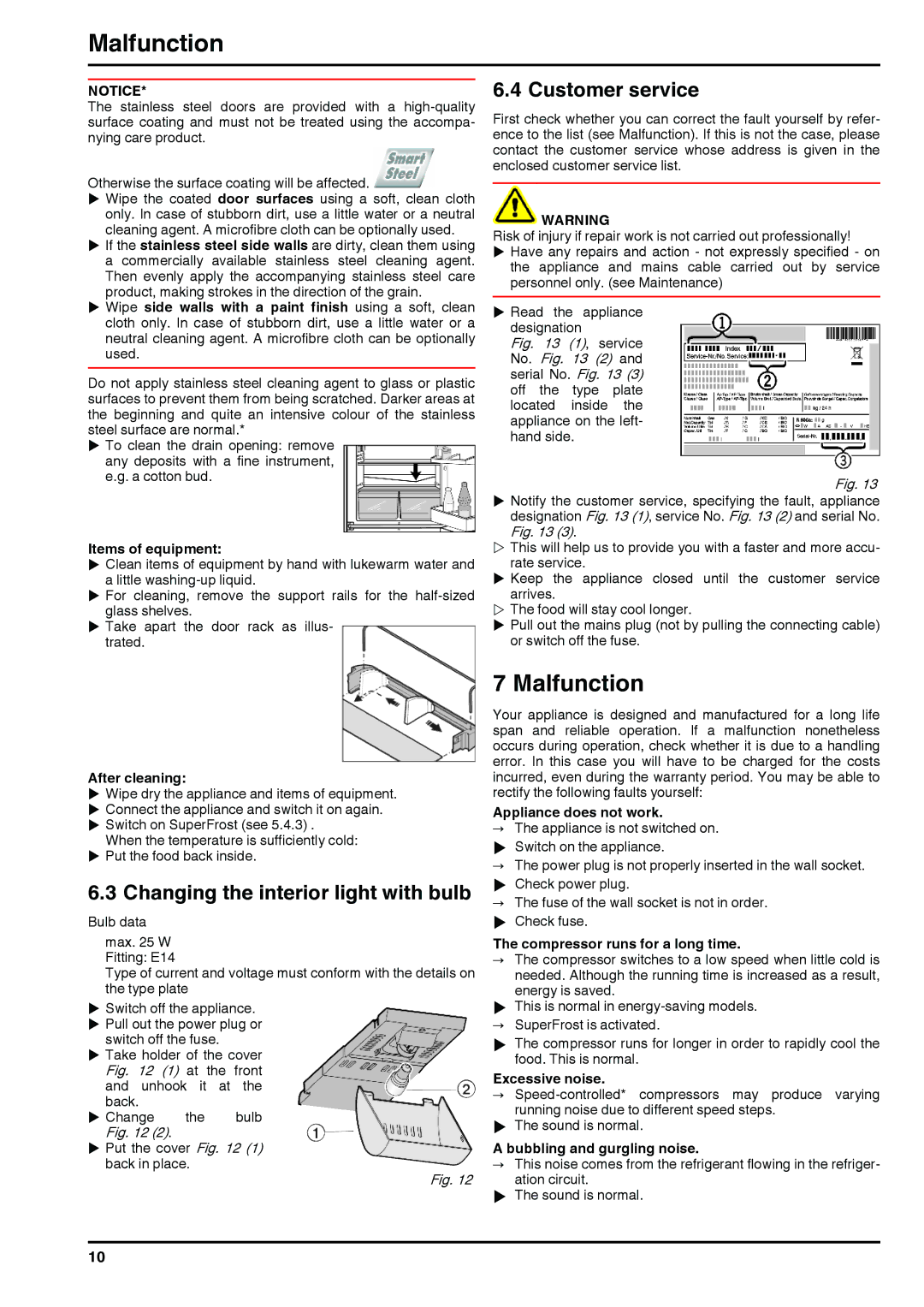
Malfunction
NOTICE*
The stainless steel doors are provided with a
Otherwise the surface coating will be affected.
u Wipe the coated door surfaces using a soft, clean cloth only. In case of stubborn dirt, use a little water or a neutral cleaning agent. A microfibre cloth can be optionally used.
u If the stainless steel side walls are dirty, clean them using a commercially available stainless steel cleaning agent. Then evenly apply the accompanying stainless steel care product, making strokes in the direction of the grain.
u Wipe side walls with a paint finish using a soft, clean cloth only. In case of stubborn dirt, use a little water or a neutral cleaning agent. A microfibre cloth can be optionally used.
Do not apply stainless steel cleaning agent to glass or plastic surfaces to prevent them from being scratched. Darker areas at the beginning and quite an intensive colour of the stainless steel surface are normal.*
u To clean the drain opening: remove any deposits with a fine instrument, e.g. a cotton bud.
Items of equipment:
u Clean items of equipment by hand with lukewarm water and a little
u For cleaning, remove the support rails for the
u Take apart the door rack as illus- trated.
After cleaning:
u Wipe dry the appliance and items of equipment. u Connect the appliance and switch it on again. u Switch on SuperFrost (see 5.4.3) .
When the temperature is sufficiently cold: u Put the food back inside.
6.3 Changing the interior light with bulb
Bulb data max. 25 W Fitting: E14
Type of current and voltage must conform with the details on the type plate
uSwitch off the appliance.
uPull out the power plug or switch off the fuse.
uTake holder of the cover Fig. 12 (1) at the front and unhook it at the back.
uChange the bulb Fig. 12 (2).
uPut the cover Fig. 12 (1) back in place.
6.4 Customer service
First check whether you can correct the fault yourself by refer- ence to the list (see Malfunction). If this is not the case, please contact the customer service whose address is given in the enclosed customer service list.
![]() WARNING
WARNING
Risk of injury if repair work is not carried out professionally!
u Have any repairs and action - not expressly specified - on the appliance and mains cable carried out by service personnel only. (see Maintenance)
u Read the appliance designation
Fig. 13 (1), service No. Fig. 13 (2) and serial No. Fig. 13 (3) off the type plate located inside the appliance on the left- hand side.
Fig. 13 u Notify the customer service, specifying the fault, appliance designation Fig. 13 (1), service No. Fig. 13 (2) and serial No.
Fig. 13 (3).
w This will help us to provide you with a faster and more accu- rate service.
u Keep the appliance closed until the customer service arrives.
w The food will stay cool longer.
u Pull out the mains plug (not by pulling the connecting cable) or switch off the fuse.
7 Malfunction
Your appliance is designed and manufactured for a long life span and reliable operation. If a malfunction nonetheless occurs during operation, check whether it is due to a handling error. In this case you will have to be charged for the costs incurred, even during the warranty period. You may be able to rectify the following faults yourself:
Appliance does not work. | |
→ | The appliance is not switched on. |
u | Switch on the appliance. |
→ | The power plug is not properly inserted in the wall socket. |
u | Check power plug. |
→ | The fuse of the wall socket is not in order. |
uCheck fuse.
The compressor runs for a long time.
→ The compressor switches to a low speed when little cold is needed. Although the running time is increased as a result, energy is saved.
u This is normal in
u The compressor runs for longer in order to rapidly cool the food. This is normal.
Excessive noise.
→
u The sound is normal.
A bubbling and gurgling noise.
→ This noise comes from the refrigerant flowing in the refriger- ation circuit.
u The sound is normal.
10
